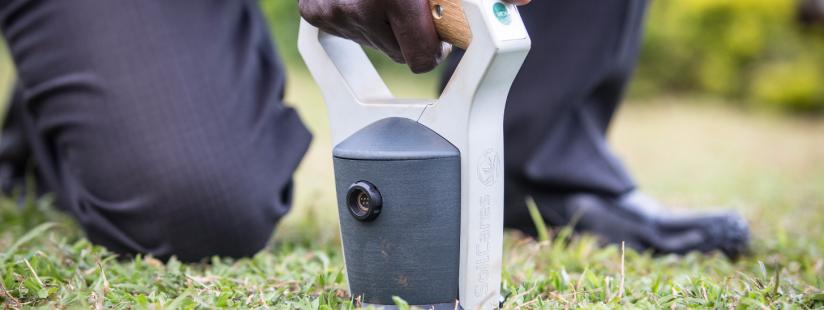With the average age of farmers worldwide rapidly increasing, attracting youth to agriculture becomes a hot topic. But how can we turn this not-that-sexy sector into a desired career path for youngsters? According to SoilCares Foundation, a Netherlands-based NGO, the key is introducing innovative technology for agriculture. The Foundation works closely with the SoilCares company and Rabobank Foundation in distributing a Soil Scanner on the Kenyan market.
Improving food security one scan at a time
With the average age of farmers worldwide rapidly increasing, attracting youth to agriculture becomes a hot topic. But how can we turn this not-that-sexy sector into a desired career path for youngsters? According to SoilCares Foundation, a Netherlands-based NGO, the key is introducing innovative technology for agriculture. The Foundation works closely with the SoilCares company and Rabobank Foundation in distributing a Soil Scanner on the Kenyan market.
Improving food security one scan at a time
The growing worlds population puts a lot of pressure on farmers to produce more. SoilCares Foundation believes the key to feeding the world is sustainable soil management. The Foundation was created in 2014 with the aim to improve food production and food security by promoting sustainable soil management. The organization emphasizes the importance of testing soil quality that can be done with the soil Scanner. Getting their soil tested allows farmers to apply the exact type and amount of fertilizer that their soil needs. This leads to improved yield but also lowers the costs on fertilization and minimizes the chances of environmental damage.
Practical soil information within 10 minutes
SoilCares Soil Scanner is a tool that provides practical soil information within 10 minutes. The handheld device connects to a smartphone via Bluetooth and generates a report about the soil status and nutrient needs. The Scanner uses near-infrared sensors and a connection to SoilCares Global Soil Database to accurately determine soil properties such as pH level, organic matter content and NPK. The generated report that can be printed on-the-spot using a portable printer.
Scanning for success
In mid-2016 SoilCares Foundation and Rabobank Foundation set up the Scanning for Success Project. The project aims to reach 75,000 smallholder farmers with soil testing by implementing the first 165 Soil Scanners in Kenya. The distribution of the Soil Scanners started in January 2017.
The goal of the project is to increase the livelihoods of smallholder farmers and to stimulate local entrepreneurship. SoilCares Foundation provides not only the tool but also training on soil sampling, fertilizer use and soil fertility. Project participants have the chance to become soil experts and start their own business providing soil testing services to farmers using the Scanner.
Participants in the Scanning for Success project are offered the option to use five Scanners for a fee of 500 per Scanner for one year. After this year they may decide to buy the Scanner or return it to SoilCares. The final price depends on the number of scans reached. The more scans made, the lower the costs. For instance, if 800 or more scans were made during the year, project partners can obtain the Scanner without any additional costs.
As Christy van Beek, director of the SoilCares Foundation, says, The Soil Scanner actually enables young people to build a profitable business case. Most of the people who currently provide soil testing as a service with the Scanner add a margin of about 700 Kenyan shillings per scan. With 800 scans per year, this means a profit of 560 000 shillings which is about 4500 euro. Moreover, our latest feedback survey shows that 92 percent of service providers have returning customers. It seems that increasing farmers awareness of the effect of soil fertility on crop yield also increases their demand for soil testing.
Closing the food gap begins with closing the knowledge gap
One of the greatest challenges of our time is feeding the growing population of the earth in sustainable way. The SoilCares Foundation believes the key to solving this issue is implementing new agricultural technology that will increase the productivity of farms. However, providing the technology is not enough as many farmers worldwide lack the knowledge on soil fertility. SoilCares Foundation provides training to young Kenyans who equipped with the Soil Scanner will spread the soil knowledge among their network of farmers.
As Christy van Beek says, We believe that closing the food gap begins with closing the knowledge gap. That is why we have developed a series of training materials on soil testing, soil sampling, applying fertiliser, soil fertility and introduction to soil science. We hope these materials will build the capacity of our partners and help them in sharing the information with farmers.
Fostering entrepreneurship by training soil experts
Training people to become soil experts is the Foundations way to foster entrepreneurship and stimulate local job creation. But the Foundation has one more goal in mind: making soil interesting to young people. As Christy van Beek says, Soil is an often underestimated resource but it is crucial for our survival on this planet. We want to make the invisible soil visible!
The original article is publishes at Agrilinks.

